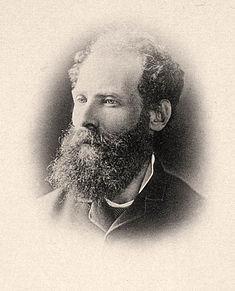Antero Quental
Antero Tarquínio de Quental (Portuguese pronunciation: [ɐ̃ˈtɛɾu dɨ kẽˈtaɫ]; old spelling Anthero) (18 April 1842 – 11 September 1891), was a Portuguese poet, philosopher and writer, whose works became a milestone in the Portuguese language, alongside those of Camões, Bocage and Pessoa.
He was born in Ponta Delgada on the island of São Miguel, in the Azores, into one of the oldest families of the provincial captaincy system. Antero was baptized on 2 May 1842 (few days after his birth), much to the rejoicing of his mother. His parents, Fernando de Quental (Solar do Ramalho; 10 May 1814 – São Miguel Island, Ponta Delgada, Matriz; 7 March 1873), a veteran from Portuguese Liberal Wars who took part in the Landing of Mindelo and, in his liberal enthusiasm and wife Ana Guilhermina da Maia (Setúbal, 16 July 1811 – Lisbon 28 November 1876), a devout Roman Catholic. He was also a relative of Frei Bartolomeu de Quental, founder of the Congregation of the Oratory in Portugal.
He began to write poetry at an early age, chiefly, though not entirely, devoting himself to the sonnet. He took French lessons under António Feliciano de Castilho, a leading figure of Portuguese Romantic movement, who resided in Ponta Delgada at the time. Antero was seven when he enrolled in Liçeu Açoriano (a private school), where he received English lessons from a Mr. Rendall, a renowned prospector on the island. In August 1852, he moved with his mother to the Portuguese capital, where he studied at Colégio do Pórtico, whose headmaster was his old tutor Castilho. But the institution closed its doors, and Antero returned to Ponta Delgada in 1853. On writing to his old headmaster, he would say:
...
Wikipedia

